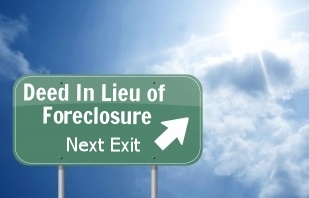 If your lender is threatening to foreclose on you for missed mortgage payments and you don't have the money to get current, and aren't eligible for a loan modification, you may be a candidate for a deed in lieu of foreclosure agreement. A deed-in-lieu of foreclosure agreement is when the borrower agrees to give ownership of their home to the lender in exchange for canceling their mortgage.
If your lender is threatening to foreclose on you for missed mortgage payments and you don't have the money to get current, and aren't eligible for a loan modification, you may be a candidate for a deed in lieu of foreclosure agreement. A deed-in-lieu of foreclosure agreement is when the borrower agrees to give ownership of their home to the lender in exchange for canceling their mortgage.
Of course, this is only an option for homeowners who owe more on their mortgage than the home could be sold for, and it does require both parties to come to an agreement. Although not for everyone, there are benefits to a deed in lieu over foreclosure for both the lender and the borrower.
Benefits For The Homeowner
 You're no longer responsible for your mortgage payments. Transferring ownership of your property to the bank gets you out of your mortgage.
You're no longer responsible for your mortgage payments. Transferring ownership of your property to the bank gets you out of your mortgage.- Your credit may take slightly less of a hit than if you went through foreclosure. Although it's probably not much less because you still defaulted on payments.
- You don't have to sell the house, like in a short sale. With this agreement, you transfer ownership to the lender and they have to sell it themselves.
- You don't have to go through foreclosure. The agreement states that foreclosure will not go forward or be initiated.
Benefits For The Lender
- They don't have to pay for foreclosure proceedings and eviction. It takes time and money for the bank to go through with foreclosure, especially in judicial foreclosure states, which require the lender to file a lawsuit.
- They are more likely to receive the home in good, salable condition. Angry homeowners who feel the bank treated them unfairly, and have nothing to lose, have been known to steal copper pipes and anything else of value in the home, and to purposefully damage the home out of spite. There are cases of homeowners turning on all the water faucets to flood the home, leaving fish to rot in the attic, and pouring concrete down the drains. The lender would prefer to keep you on their good side to minimize the risk of this type of retribution.
Some Things To Keep In Mind With A Deed-In-Lieu
A deed-in-lieu of foreclosure may be the best option for you but it still takes some work. The application process is similar to that of a loan modification, but with a deed-in-lieu the bank is looking to see that you can't afford the payment. This means you will be required to show your tax returns, pay stubs, W-2s, and more.
You'll probably be required to have the property listed for sale for at least 90 days before the lender agrees to the deed-in-lieu. After all, the bank doesn't want to take ownership and responsibility for selling the property if you can do it yourself. The bank is in the making money through lending business, not the house-flipping business. They don't want an inventory of homes that costs money to maintain, market, and sell. So they'll only accept the agreement when it's better for them than going through the foreclosure and eviction process, where they'll take ownership anyway.
You can't get this agreement if you have home equity loans, second and third mortgages, or liens on your property. Like with a sale or loan mod, you still have to take care of any liens before you can alter or transfer ownership of the property.
Remember that you'll want to get a deficiency judgment waiver so the lender can't sue you for the deficient amount, which is the difference between what the property sells for and what you owed on the mortgage. The bank can also add fees and interest to that amount. Deficiency waivers are not automatic in deed-in-lieu or short sale agreements, and you'll want an attorney to make sure that language is included in the agreement that clears you of any responsibility for the deficiency.
There may be tax consequences because the cancelled debt from your loan is treated like income and is reported to the IRS. You will receive a 1099-C form that shows the amount of your cancelled debt, and you are required to pay taxes on that amount as if it were income. The Mortgage Forgiveness Debt Relief Act allows homeowners to not pay taxes on forgiven mortgage debt for their primary residence, and depending on when your debt was forgiven, you may be eligible.
The homeowner who has experienced tough times and fallen behind on mortgage payments and the bank that's foreclosing on them don't have to be enemies. They actually have some things in common, and cooperation is possible. Both of you were hoping that the home would be affordable and that you could pay off the loan under the agreed upon terms, and it didn't work out for either of you. Foreclosure, short sale, or deed in lieu agreements are not outcomes anybody was hoping for when the property was purchased. Now that all of those options are up for consideration, it really can benefit both parties to come to an agreement instead of going through court.
Unless you're an expert on real estate contracts, you'll probably need a lawyer on your side to make sure you get the best deal possible. Your lender surely has an experienced legal team working for them. A qualified attorney with a record of getting results for people in your situation can help you determine if a deed in lieu of foreclosure agreement is the best option for you, and make sure you're not taken advantage of in the process.
Images courtesy of scottchan and stockimages at FreeDigitalPhotos.net










